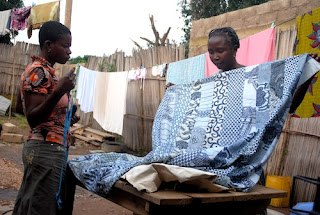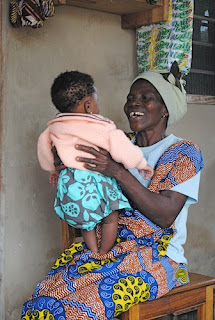The entirety of Wednesday was spent at the workshop with only a small break for lunch at our now regular spot. The women had thus far made one market bag, one leather bag modeled after the “China bag”, one pillowcase, and assorted bits and pieces of other products. This was a big accomplishment, especially considering the fact that Chantal is the only one undertaking most, if not all processes of production. As we added various pieces to the collection such as napkins, place settings, a canvas market bag, a pleated evening clutch with glass beads, and batik wrapped bangles, everything was starting to fall into place. Seeing it all start to come together, to see these pieces that would cater around a lifestyle and be so representative of Aklala but also have such a mass appeal is extremely rewarding and really exciting.
Coming back after lunch, we asked Chantal some hard questions about the inspiration for her designs and what she saw as the unifying thread in all of her products before and after Marcella. Chantal first said that she felt really drawn to flowers, so she used them to represent women as the flowers in the family. “A household without a woman is dull and lifeless; it’s women that give communities their color and joy.” As for blues, which have always figured prominently in her pieces, she said she’s inspired by the sky, because the sky is the highest visual reference, and it’s a constant reminder to always look up and aspire for more. In this way she wants to empower women to elevate themselves to a higher level. While these are beautiful messages that I’m sure have some elements of authenticity, we couldn’t quite shake the feeling that Chantal was telling us exactly what she thought we wanted to hear. It’s like she was playing our own jargon against us, which makes sense on so many levels. Women around the world have been marginalized in the global economic order both as women and as members of underdeveloped nations. They have been put in positions of dependency that have left them vulnerable to predatory interventions that ostentatiously aim for empowerment, but have often only further indebted them and entrenched their dependent conditions. While Nest is in no way exploitative, it does come with inherent roles of service provider and service receiver. Chantal and these women are using whatever tricks they have up their sleeves to benefit from our presence as much as possible. I have to hand it to them; these women are smart. They know what are our goals are for them, and they know that if they can feign our metrics of success then future service provision will be all the more likely. So even though they’re giving us cookie cutter responses to make both of our lives easier, it doesn’t necessarily mean it’s for the best. For us it’s there’s no real benefit in hearing the repetition of some hackneyed metaphor if its not genuine. We want to hear Chantal’s own opinions, even if she hasn’t fully formed them yet; I’d rather get authenticity even if it’s not what I want to hear, than uplifting clichéd anecdotes.
Another issue that arose when speaking to Chantal is that she seems to have a lack of context in situating herself amongst her international producer counterparts. Part of the problem is that she doesn’t have a full understanding of who or what her competition is. This stems from an inability to locate her role in international markets due to insufficient information, as a result she relates herself to mostly other Togolese women producers. In comparison to those in her community, her business is much more advanced and connected to westerners, thus making her more successful in all of their eyes. The catch is that Chantal’s products aren’t solely competing in West Africa, they are entering saturated international markets, and as of now she has no way to gauge her own product quality versus that of her competition. Products from Aklala are juxtaposed next to those from artisans and factories around the world, made by producers that have had many more resources, experiences and skills in order to perfect them. But instead of this motivating Chantal to improve her own product quality, she remains uninformed and overconfident. Chantal looks at a superiorly crafted product and thinks she is just as capable of making it; in this sense, she isn’t operating with an understanding of her own limitations. Right now she doesn’t even have a lot of the skills necessary for production, even though she assumes the skill level is there because she’s had so many years of practice and training. It’s not there, and that’s more the fault of the vocational apprenticeship training system, rather than her own inadequacies, as no one has shown her how to do things better. Chantal’s work is in the very early stages of production and development, and the core of the matter is that she still doesn’t have excellent products. This issue however operates within the greater cultural context of complacency. People have become so accustomed to second-rate work and services that they are almost always left uncontested. In this setting, Chantal is a highly unique entrepreneur and the fact that she has started and is now running a successful business is fairly revolutionary. Our challenge, however, is to present Chantal with a more accurate context of her position in the competitive western market for handcrafted goods, and then help her move beyond her current capacities and achieve success through merging high quality design and production with her traditional artistic skill set.
One of the other challenges in working with artisans in the developing world is that their situational circumstances dictate that they cant compete in pricing in international markets when pitted against factory-level production, so they must find other ways to create value for their enterprises. In Chantal’s case this can be done with the use of organic vegetable dyes, superior product design that respects cultural relevancies, and focusing on the traditional production processes. These will permit Chantal to command more money for her products, thus providing higher wages and profits for Aklala, which can then be put towards her more charitable goals.
After a long and successful day of working on products and working through our questions, Chantal was exhausted. We knew that we had a long day ahead of us tomorrow so we didn’t want to leave her with too much homework, but we once again outlined the agenda so she could start to at least think about time management. Tomorrow would be our last day to finish all of the products before Marcella’s depart, so this was make it work time.








No comments:
Post a Comment